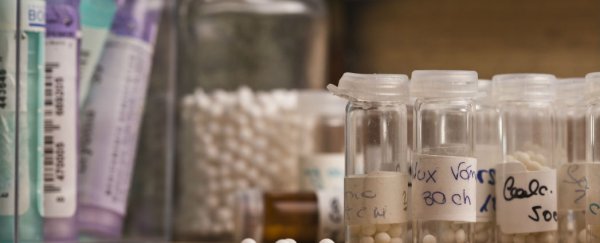A massive new study conducted in Australia has found that homeopathy is no more effective in treating ailments and disorders than placebos.
Conducted by the Australian National Health and Medical Research Council (NHMRC), the report is an examination of 1,800 papers testing the effects of all kinds of alternative medicines over the past two decades. The team found that out of all these papers, only 225 could be included in their analysis due to a general lack of actual science.
Of the papers they looked at, they conducted "an overview of published systematic reviews by an independent contractor; an independent evaluation of information provided by homeopathy interest groups and the public; and a consideration of clinical practice guidelines and government reports on homeopathy published in other countries."
They looked at a wide range of over 20 health conditions, from coughs and eczema to bronchitis and heroin addiction, and assessed the quality of the evidence provided in the papers. If a paper's conclusion was convincing, it got a rating of one - which means 'very strong' - and if it was dubious, it got a rating of four - 'very weak'.
The idea behind homeopathy is that you can actually treat yourself with substances derived from plants, minerals, or animals, that would normally make you sick, as long as it's in a small enough dose. That small dose then prompts an immune response and strengthens the person's ability to ward off infections and other diseases. While a major criticism is that homeopathic treatments contain a minuscule amount of the actual ingredient, advocates say that minuscule amount is all it takes to treat ailments such as coughs, headaches, asthma, and depression.
The conclusion of the study blows that declaration out of the water, stating:
"There was no reliable evidence from research in humans that homeopathy was effective for treating the range of health conditions considered: no good-quality, well-designed studies with enough participants for a meaningful result reported either that homeopathy caused greater health improvements than placebo, or caused health improvements equal to those of another treatment.
For some health conditions, studies reported that homeopathy was not more effective than placebo."
The official advice given as a result of the report is that homeopathy should not be used to treat health conditions that are chronic, serious, or could become serious, as doing so could actually be putting yourself at a greater risk of getting even more sick.
It's a pretty damning statement, and while the Chair of the NHMRC Homeopathy Working Committee, Paul Glasziou from Bond University in Queensland, told Melissa Davey at The Guardian that some people will probably think it's "all a conspiracy of the establishment," he hopes the report will prompt some people to reconsider selling or using homeopathic substances.
When given a chance to comment, Australian Homeopathic Association spokeswoman, Ana Lamaro, told Rebecca Trigger at ABC News that based on a draft position paper that was leaked in 2012, the NHMRC had already made up its mind about homeopathy, even before it started its review of the evidence. "We call that basically a prejudicial position, and of course they have to find exactly in such a manner or else they would have egg all over their faces," she said.
"People can erroneously waste their time and endanger their health by using remedies that they believe will work when they're not evidence based, and it's a waste of money and it's a danger to an individual's health," the Australian Medical Association (AMA) chair of the council of general practice, Brian Morton, said in response.
While many of our private health insurance policies still provide cover for alternative medicine, the Australian government is now considering stripping those rebates away in April if the advertised effects are not supported by scientific evidence.
The NHMRC has made the report, and plenty of supplementary materials, freely available on their website.
Sources: The Guardian, ABC News
